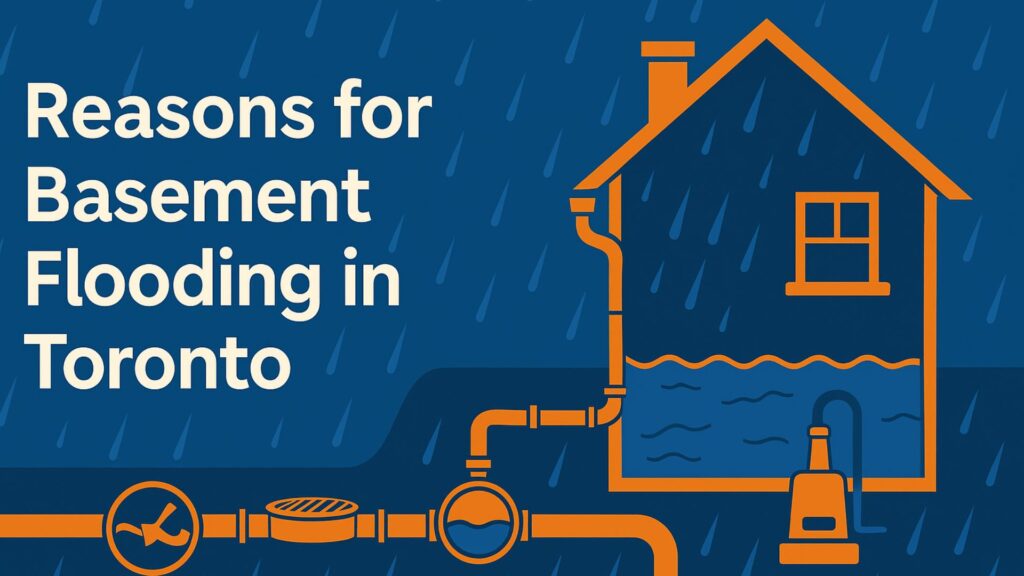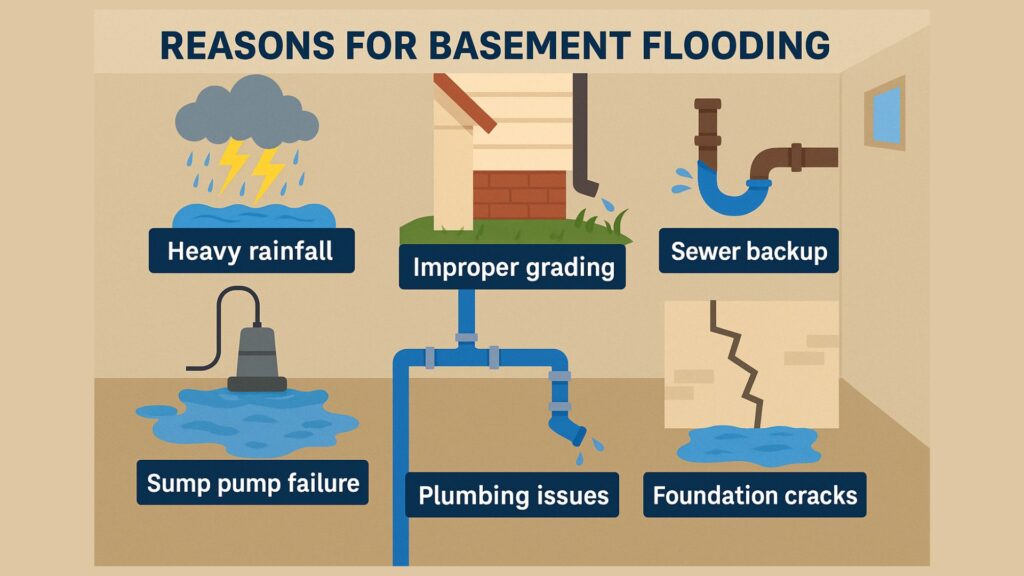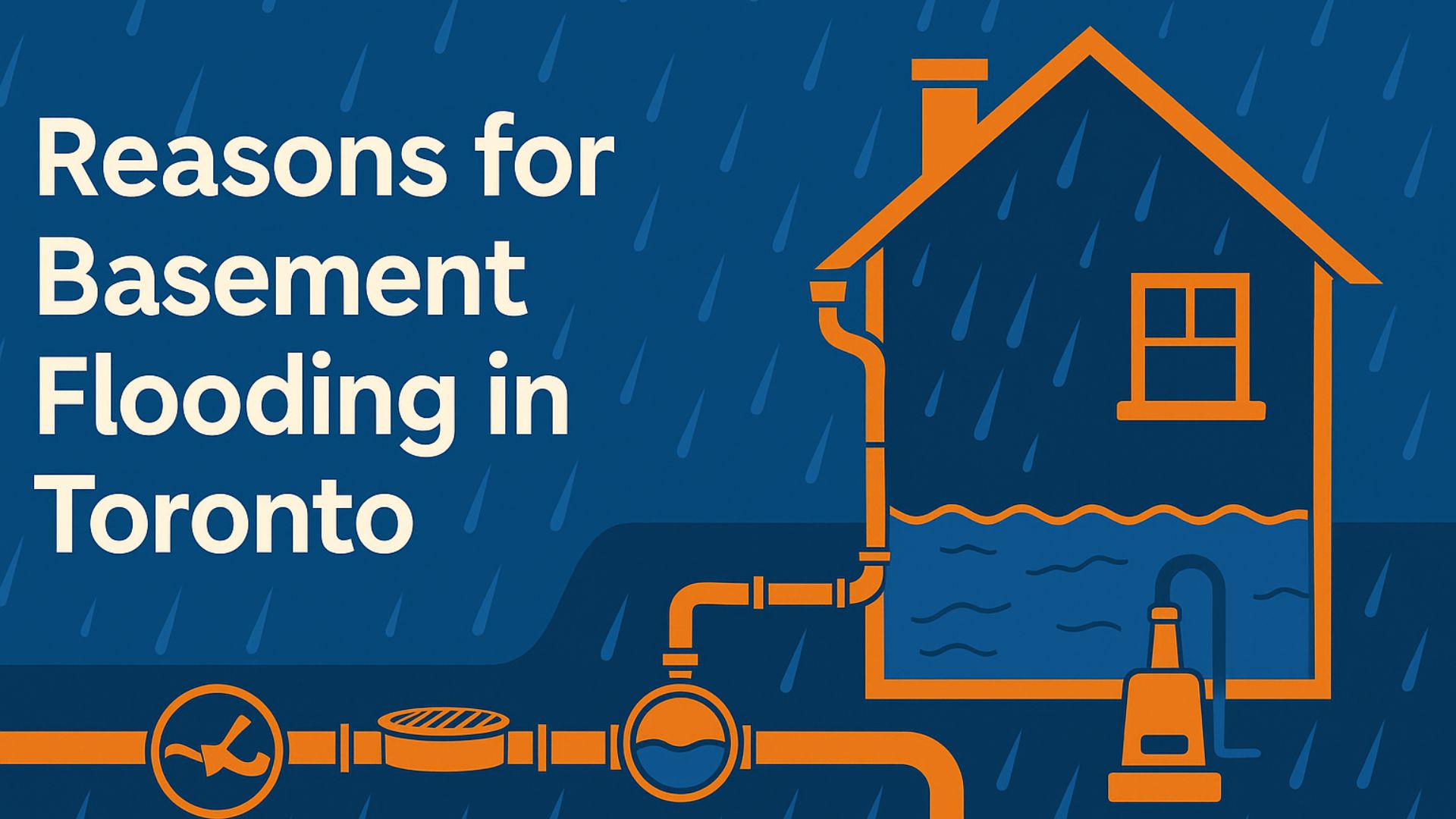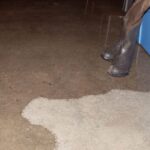
Basement flooding in Toronto is a headache for thousands of homeowners. The cost of repairs, lost items, and the mess can be overwhelming. Many people wonder, “Where does the water actually come from?” The truth is, there are several hidden reasons for basement flooding in Toronto.
These include heavy rainfall, foundation cracks, and issues such as sump pump failure. Understanding these causes is key to smart basement flood prevention and protecting your home from future disasters. Let’s discuss these causes in detail.
Content
What are the Most Common Toronto Basement Flooding Causes
Basements in Toronto flood for many reasons, but certain issues are much more frequent. Sudden rainwater infiltration during spring and fall storms puts massive pressure on homes. This can easily overload our waterproofing systems. When that happens, water pushes in through the cracks of our foundation, and a minor leak can become a big problem fast.
Homes with improper property grading often see water pooling next to the house, which only increases the risk. Many people forget that even well-built homes can suffer from a drainage problem or old weeping tiles that no longer move water away.
Case Study: A real-life example happened on 8 July 2013, when Toronto experienced one of its heaviest storms. According to the CBC, more than 4,700 basements were flooded across the city, causing millions in damages (CBC News, 2013). The main culprit? Extreme rain overwhelmed storm sewers and sump pumps, leading to catastrophic basement flooding in minutes.

Problem #1 – Heavy Rainfall and Stormwater Overflow
Toronto gets more intense rain each year. When heavy storms arrive, the city’s aging storm sewer pipe network can’t keep up. Streets flood, and water searches for a way inside, often finding its path through small cracks or gaps. This is why rain is one of the most common culprits behind Toronto basement flooding.
Problem #2 – Improper Grading and Foundation Slope Issues
The grade of your lawn matters. If your yard isn’t sloped to slope away from your home, water will gather near the walls. Over time, this causes foundation cracks and lets moisture seep in. Many older homes in Toronto weren’t designed with proper property grading in mind, which only increases risk.
Problem #3 – Sewer Backup and Municipal System Overload
During a storm, the sewer tie-in line can’t always handle the flow. If there’s a damaged or clogged sewer line, water and even raw sewage can flow back into your basement. This problem is common in neighbourhoods with combined sewers. Installing backwater valves is a must for modern protection.
Problem #4 – Power Outages, Pump Malfunctions
Every Toronto homeowner fears the failure of their sump pump during a blackout. Sump pump backup systems and battery backup power can save the day. If you skip routine checks and annual inspections, you could end up with a flooded basement just when you need protection most.
Problem #5 – Plumbing Malfunctions
Sometimes, it’s not the weather but your own pipes that fail. A pipe burst, a leaking water heater, or a faulty appliance can flood a basement in hours. Regular plumbing inspection by a licensed plumber will catch issues before they become disasters.
Problem #6 – Unprotected Basements
A lack of backwater valves, poor window wells, or missing caulking and weather stripping leaves basements exposed. Water can sneak in from almost anywhere—old outdoor faucets, broken drains, or cracked concrete. Homeowners who invest in proper waterproofing systems experience far fewer headaches.
Why Does Basement Flooding Happen in Both Dry and Wet Weather?
You might think basement flooding only happens during storms, but that’s not true. In dry weather, problems like hidden leaks, high groundwater or foundation cracks can let water in. During wet periods, heavy rain, rapid snowmelt, or city sewer backup add new risks. Both situations lead to damage unless you stay vigilant.
Here’s a quick look:
| Weather Condition | Common Causes of Basement Flooding | Warning Signs to Watch For | Prevention Tips |
| Dry Weather | – Plumbing leaks from faulty pipes – High groundwater levels – Hidden foundation cracks – Malfunctioning outdoor faucets – Old or broken weeping tiles | – Unexplained damp spots – Mouldy smells – Increased water bills | – Regular plumbing inspection – Seal foundation cracks – Upgrade weeping tiles |
| Wet Weather | – Heavy rainfall and stormwater overflow – Rapid snowmelt – Sewer backup from overloaded city lines – Poor gutter maintenance – Blocked downspout extension | – Water pooling near the house – Overflowing gutters – Slow drains | – Install a backwater valve – Clean gutters and downspouts – Grade the property away from the house |
How to Stop Your Basement from Flooding
There are many ways to protect your basement.
- Installing backwater valves and a reliable sump pump is a great start.
- Use a downspout extension and make sure your gutter maintenance is up to date.
- Keep window wells clear and use covers.
- Seal every crack with caulking and weather stripping.
Test your sump pump and have a licensed plumber in Toronto perform a plumbing inspection every year.
Don’t forget to use city programs, like the Protective Plumbing Rebate program, which offers rebates for upgrades like weeping tiles and storm sewer pipe regular maintenance (Toronto Water Rebates).
Conclusion
The reasons for basement flooding in Toronto are many and varied. From weather extremes to failing pumps, poor yard grading, and old pipes, every home has risks. Don’t wait for a disaster. Invest in good drainage, routine checks, and upgrades like backwater valves to keep your basement flood free. With a few smart steps, you can protect your home and wallet from Toronto’s next big storm. Don’t risk costly damage—protect your home with trusted experts.
Here’s what one of our clients, Ykram, had to say:
“In late Jan. my upstairs drainage stopped working. After renting a snake and still no drainage, I called Mike… The team finished quickly, even coming back to finish the inspection. I was 100% satisfied with the results…”
For fast, friendly service and help with city rebates, contact Canadian Rooter today.
FAQs About Basement Flooding in Toronto
What causes flooding in Toronto?
Flooding in Toronto is mainly caused by heavy rain, sewer overloads, rapid snowmelt, and poor drainage.
Why would the basement flood?
Basements flood due to sewer backups, pump failures, cracks, leaks, or bad grading.
What is the basement flooding program in Toronto?
Toronto’s program gives rebates for installing flood prevention devices like backwater valves and sump pumps.
What has Toronto done to prevent flooding?
Toronto has upgraded sewers, improved drainage, and offers rebates to help homeowners prevent flooding.

Elena Mohr is a dedicated home blogger who has been blogging for over six years. She covers everything home related. Elena also loves writing posts about her travels to Europe with her husband and two children.












